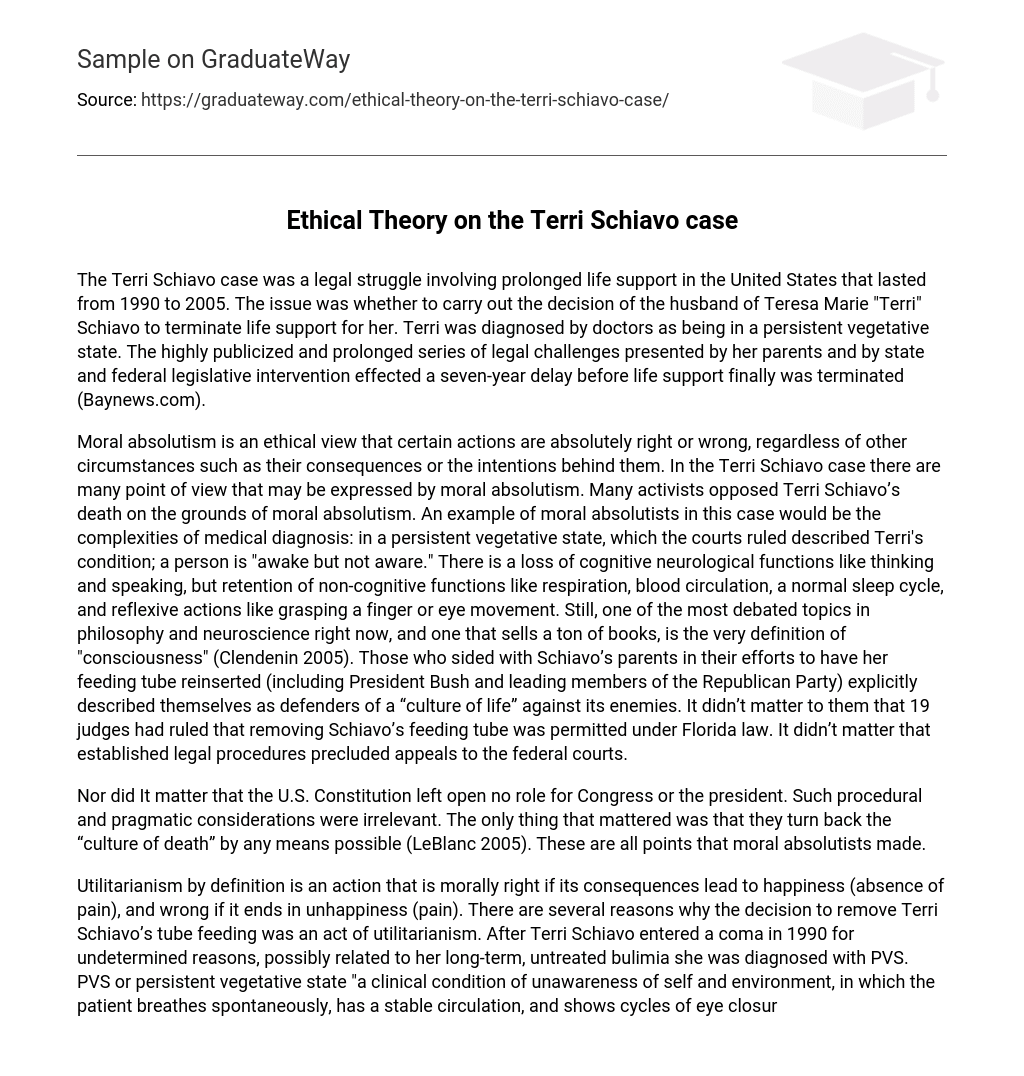The Terri Schiavo case was a legal struggle involving prolonged life support in the United States that lasted from 1990 to 2005. The issue was whether to carry out the decision of the husband of Teresa Marie “Terri” Schiavo to terminate life support for her. Terri was diagnosed by doctors as being in a persistent vegetative state. The highly publicized and prolonged series of legal challenges presented by her parents and by state and federal legislative intervention effected a seven-year delay before life support finally was terminated (Baynews.com).
Moral absolutism is an ethical view that certain actions are absolutely right or wrong, regardless of other circumstances such as their consequences or the intentions behind them. In the Terri Schiavo case there are many point of view that may be expressed by moral absolutism. Many activists opposed Terri Schiavo’s death on the grounds of moral absolutism. An example of moral absolutists in this case would be the complexities of medical diagnosis: in a persistent vegetative state, which the courts ruled described Terri’s condition; a person is “awake but not aware.” There is a loss of cognitive neurological functions like thinking and speaking, but retention of non-cognitive functions like respiration, blood circulation, a normal sleep cycle, and reflexive actions like grasping a finger or eye movement. Still, one of the most debated topics in philosophy and neuroscience right now, and one that sells a ton of books, is the very definition of “consciousness” (Clendenin 2005). Those who sided with Schiavo’s parents in their efforts to have her feeding tube reinserted (including President Bush and leading members of the Republican Party) explicitly described themselves as defenders of a “culture of life” against its enemies. It didn’t matter to them that 19 judges had ruled that removing Schiavo’s feeding tube was permitted under Florida law. It didn’t matter that established legal procedures precluded appeals to the federal courts.
Nor did It matter that the U.S. Constitution left open no role for Congress or the president. Such procedural and pragmatic considerations were irrelevant. The only thing that mattered was that they turn back the “culture of death” by any means possible (LeBlanc 2005). These are all points that moral absolutists made.
Utilitarianism by definition is an action that is morally right if its consequences lead to happiness (absence of pain), and wrong if it ends in unhappiness (pain). There are several reasons why the decision to remove Terri Schiavo’s tube feeding was an act of utilitarianism. After Terri Schiavo entered a coma in 1990 for undetermined reasons, possibly related to her long-term, untreated bulimia she was diagnosed with PVS. PVS or persistent vegetative state “a clinical condition of unawareness of self and environment, in which the patient breathes spontaneously, has a stable circulation, and shows cycles of eye closure and opening that may simulate sleep and waking” [Working Group of Royal College Physicians, “The Permanent Vegetative State,” The Journal of the Royal College of Physicians 430 (1996): 119-21]. Since patients in such a state sometimes show behavior that could be interpreted as evidence of consciousness, the diagnosis is not always self-evident (ascensionhealth.org). “Patients in a persistent vegetative state do not feel pain, nor do they “suffer,” Pain, as well as suffering, requires consciousness, which is lacking in a person in a persistent vegetative state, says Michael De Georgia, MD, head of the neurology-neurosurgery intensive care unit at the Cleveland Clinic Foundation (Joshua). Terri remained in this persistent vegetative state the last fifteen years of her life. Both Schiavo’s doctors and her court-appointed doctors expressed the opinion that there existed no hope of rehabilitation.
Her husband, Michael Schiavo, and several other witnesses testified that Terri, on multiple instances expressed her wish not to live in that manner. Therefore, Michael Schiavo contended that it was his wife’s wish that she not be kept alive through unnatural, mechanical means. Upon the final autopsy of Terri Schiavo’s brain itself weighed only 615 g, only half the weight expected for a female of her age, height, and weight, an effect caused by the loss of a massive number of neurons. Microscopic examination revealed extensive damage to nearly all brain regions, including the cerebral cortex, the thalami, the basal ganglia, the hippocampus, the cerebellum, and the midbrain revealed the damage was irreversible, and no amount of therapy or treatment would have regenerated the massive loss of neurons (Thogmartin). Meaning Terri would have remain in this non-existing state for many more years to come, and according to her husband and others she never wished to exist in a state such as this. Therefore if Terri were able to decide before hand she the decision to allow her to die would result in happiness for her.
My opinion still has not changed since my original letter. I still feel what Terri’s husband Michael Schiavo honored her wishes. Terri was in a vegetative state for over 16 years able to neither live life nor care for herself. Again, the question must be asked, would Terri prefer the quality, or quantity of life? Or would Terri have rather spend the remainder of her life bed-bound in a nursing home in a permanent vegetative state for the rest of her days.
Work-Cited:
1. “Ascension Health.” Ascension Health. N.p., n.d. Web. 30 June 2013. 2. Clendenin, Dan. “Absolute Moral Clarity? The Case of Terri Schiavo – Essay Posted 4 April 2005 – The Journey with Jesus.” Absolute Moral Clarity? The Case of Terri Schiavo – Essay Posted 4 April 2005 – The Journey with Jesus. N.p., 4 Apr. 2005. Web. 30 June 2013. 3. Joshua. “Living in a Persistent Vegetative State: Does Terri Schiavo Feel Pain?” The Waterglass. N.p., 7 Apr. 2005. Web. 30 June 2013. 4. LeBlanc, Douglas. “Is Being an Absolutist Absolutely Wrong?” GetReligion. N.p., 7 Apr. 2005. Web. 30 June 2013. 5. Thogmartin, Jon R. (2005-06-13). “”Report of Autopsy” for Theresa Schiavo, Case #5050439″. p. 34. Retrieved 2006-02-10. 6. “Utilitarianism.” BusinessDictionary.com. N.p., n.d. Web. 30 June 2013.





